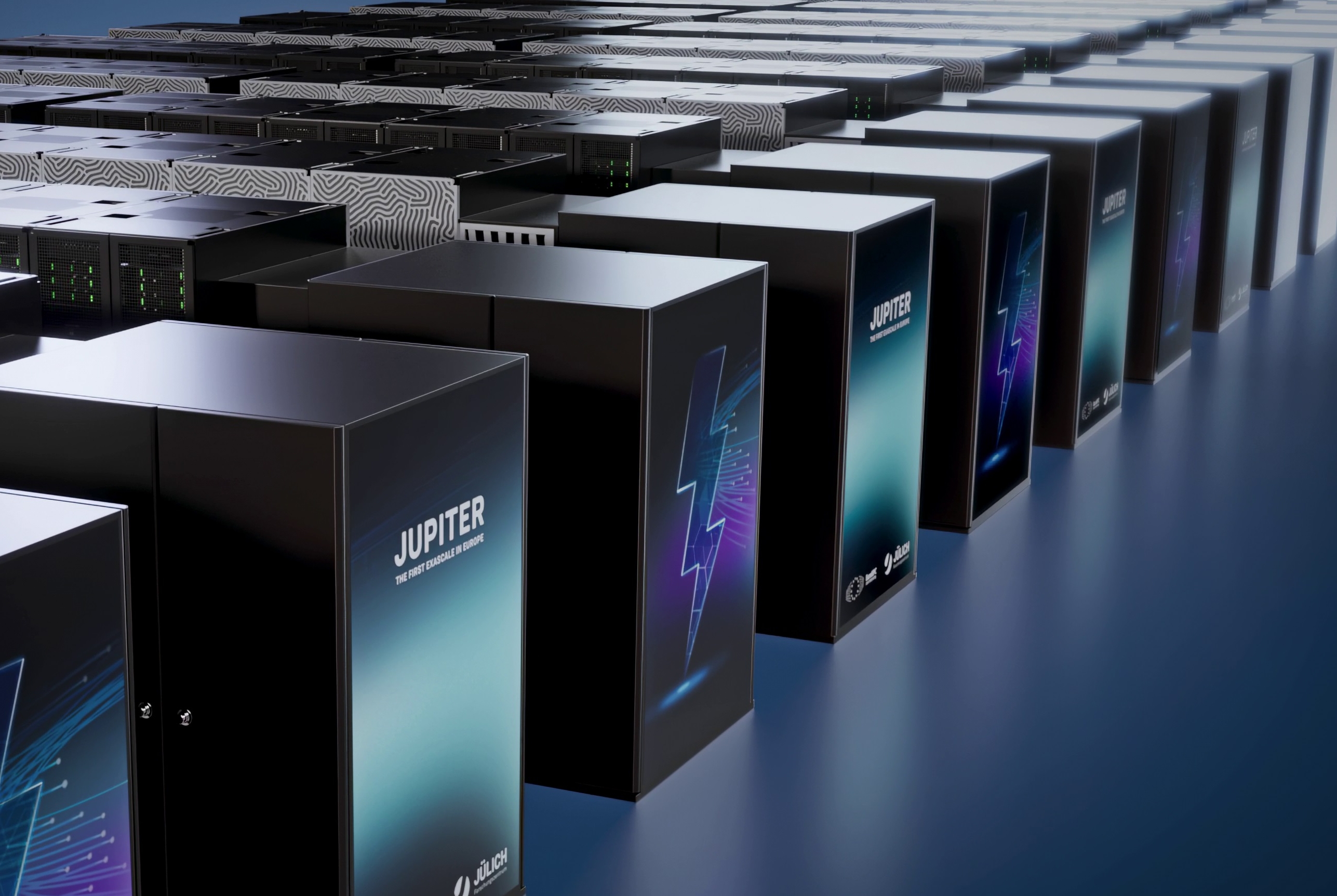Europe’s AI Booster
JUPITER AI Factory Brings Exascale Power to Business and Science
With the JUPITER AI Factory, a central pillar of Europe’s AI infrastructure is being established in Jülich. Start-ups, small and medium-sized enterprises, and industrial companies will have access to Europe’s first Exascale-class supercomputer JUPITER. The AI Factory is also open to research institutions and the public sector. Thanks to the computing power of JUPITER, which will go into operation at Forschungszentrum Jülich in the coming months, AI applications can be developed, tested, improved and scaled faster than ever before. In addition, JUPITER will also receive a specialized inference module that accelerates access to AI models via the cloud. Several leading German AI institutions have joined forces for the collaborative project, including Fraunhofer IAIS.
The AI Factory in Jülich serves as a one-stop shop for both research and industry, offering simplified access to JUPITER, Europe’s first Exascale supercomputer. The focus is on strategic key sectors, including healthcare, energy, climate change, education, media, the public sector and finance.
As the first supercomputer of the Exascale era in Europe, JUPITER will surpass the threshold of one quintillion computing operations per second, making it one of the world’s most powerful AI supercomputers. The JUPITER AI Factory is designed to drive the training of next-generation AI models and will particularly support German and European start-ups and small and medium-sized enterprises in developing high-performance, secure, and privacy-compliant AI applications.
Strong Partners for AI
The JUPITER AI Factory (JAIF) is funded with approximately €55 million by the EuroHPC Joint Undertaking, the German Federal Ministry of Education and Research, and the Ministries of Science of North Rhine-Westphalia and Hesse. Several leading German AI institutions have joined forces for this collaborative project.
Alongside the Jülich Supercomputing Centre, which coordinates the initiative, main partners include the Center for Artificial Intelligence at RWTH Aachen University, the Fraunhofer Institutes for Intelligent Analysis and Information Systems IAIS and for Applied Information Technology FIT, and the Hessian Center for Artificial Intelligence. Fraunhofer IAIS is contributing its expertise and new solutions for the development and use of fully trained Large Language Models, such as Teuken-7B, to the project. The JUPITER AI Factory also benefits from the experience and networking of Fraunhofer IAIS with existing projects and initiatives at state, federal and EU level, such as the AI Service Center WestAI and the Lamarr Institute for Machine Learning and Artificial Intelligence or the Competence Platform KI.NRW. In addition, the JUPITER AI Factory works closely with the hessian.ai AI service center hessian.AISC and the German AI Association as associated partners.
In addition to access options for JUPITER, the AI Factory offers a comprehensive AI ecosystem that provides individual support for all AI use cases – from user training and personal consulting to cutting-edge services in data curation, next-generation foundation models, and AI application optimization.
New Inference Module: JARVIS
As an extension of JUPITER, the construction of another supercomputer module is planned in Jülich as part of the AI Factory: The JUPITER inference system JARVIS (JUPITER Advanced Research Vehicle for Inference Services), a cloud-based AI inference platform integrating experimental European technologies. JARVIS thus complements JUPITER's other two modules, Booster and Cluster.
While the JUPITER booster module with its approximately 24,000 NVIDIA GPUs is responsible for the intensive training of AI models—processing vast datasets and optimizing neural network weights— JARVIS takes over the subsequent inference, i.e., the application, for example for text generation, image analysis or complex calculations, as well as the further optimization of the models, the so-called refinement learning.
JARVIS will support cutting-edge inference techniques such as Inference Time-Scaling. These methods allow AI models to allocate more computational resources for complex problem-solving, improving decision-making by weighing multiple solution strategies to determine optimal outcomes.
Background: Strengthening AI Innovation in Europe
The JUPITER AI Factory is a key project in implementing the »AI Innovation Package to support Artificial Intelligence Startups and SMEs«, launched by the European Commission in January 2024. It maintains a close partnership with AI Factory HammerHAI, which is operated in collaboration with the High Performance Computing Centre Stuttgart and the Leibniz Supercomputing Centre . These institutions work together with the Jülich Supercomputing Centre under the umbrella of the Gauss Centre for Supercomputing.
Additionally, the JUPITER AI Factory maintains partnerships with leading AI factories across Europe, including BSC AIF (Spain), IT4LIA (Italy), and in particular GENCI (France), where Alice Recoque, Europe’s second Exascale supercomputer, is being developed.
